Reformation Day Important Texts Collection (15 vols.)
Digital Logos Edition

Overview
The writings of the Reformers have influenced generations of Christians. Commenting on a host of issues, both ecclesial and secular, these writings continue to guide churches in their theology and church practices. This collection includes some of the most important works produced during the Reformation, including works by John Calvin, Erasmus, John Wycliffe, and Thomas Cranmer.
Key Features
- Contains important works from the Reformation
- Provides primary sources for studying Reformation history
- Contains helpful introductions and notes
Product Details
- Title: Reformation Day Important Texts Collection
- Volumes: 15
- Pages: 6,299

The Works of William Tyndale presents the writings of one of the most the important figures of the English Reformation and Western history as a whole. Tyndale’s English translation of the Bible (the Tyndale Bible) was the first complete English Bible to be translated directly from the Greek and Hebrew texts. With the timely invention of the printing press, the Tyndale Bible was also the first mass produced English Bible, making Scripture accessible to commoners for the first time in history. Tyndale’s literary skill in translation gave rise to early modern English and left an indelible mark on the language that can still be seen today in well-known phrases like “in the twinkling of an eye” and “the powers that be.” In the end, Tyndale paid for this great legacy with his life. He is memorialized in Foxe’s Book of Martyrs as the man “who, for his notable pains and travail, may be worthily called an apostle of England.”
Included in these volumes are Tyndale’s other influential works, such as The Obedience of a Christian Man, which was instrumental in King Henry VIII’s decision to separate the Church of England from Rome. Carefully edited with an extensive biographical sketch, introductions, and marginal notes, Henry Walter competently presents Tyndale’s works in a pleasant and readable format. Explore more deeply than ever the significance of this Christian pioneer through his theological, exegetical, and expositional writings.
William Tyndale (1494–1536) was an English biblical scholar and foundational figure leading up to the Reformation. Tyndale was educated at Oxford and Cambridge and developed a reputation as a gifted linguist, fluent in French, Greek, Hebrew, German, Italian, Latin, and Spanish. Influenced by Erasmus and Luther, he translated the New Testament and the Pentateuch from Greek and Hebrew into English—against the wishes of the Roman Catholic Church. Betrayed to the authorities, Tyndale was condemned as a heretic and burned alive in 1536.
For more information on this product, see here.
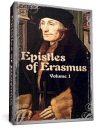
The Epistles of Erasmus, vol. 1 contains over two hundred letters from the approximate years 1493–1509, plus a detailed introduction, a chronological register of the letters, a table of correspondent's names, and five appendixes.
It offers an indispensable starting point for every future study of the great humanist.
—The Nation
Francis Morgan Nichols was born in 1826. Nichols was also the translator of works such as Britton, The Roman Forum, The Marvels of Rome, and The History of Dedham. He died in 1915.
For more information on this product, see here.
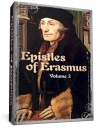
The Epistles of Erasmus, vol. 2 contains well over three hundred letters from the years 1509–1517, plus five appendixes.
This volume is full of good things, of sayings that linger in one's memory and do credit alike to the head and heart of Erasmus, and, above all things, glimpses into the literary life of Europe on the eve of the Reformation. Mr. Nichols has done his task in a way that will lay all scholars under lasting obligation. It is a monumental work.
—The London Quarterly Review
Francis Morgan Nichols was born in 1826. Nichols was also the translator of works such as Britton, The Roman Forum, The Marvels of Rome, and The History of Dedham. He died in 1915.
For more information on this product, see here.
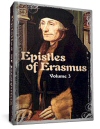
The Epistles of Erasmus, vol. 3 contains well over two hundred letters from the years 1517–1518 plus a detailed index.
Lovers of learning, and all such must be lovers of Erasmus, owe a great debt to the late Mr. Nichols.
—The English Historical Review
Francis Morgan Nichols was born in 1826. Nichols was also the translator of works such as Britton, The Roman Forum, The Marvels of Rome, and The History of Dedham. He died in 1915.
For more information on this product, see here.
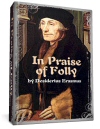
In Praise of Folly, Erasmus's best-known work, is considered one of the most notable works of the Renaissance humanists. His satirical lampooning of the traditions of European society, of the Catholic Church, and superstitions popular in his day sparked wide acclaim and wide condemnation—and sold far better than he anticipated. The work was quickly translated all over Europe, and was read for its humor, irony, rhetorical art, and statement of Christian ideals which Erasmus espoused.
We must not forget one of the greatest champions of light against the darkness, of peace against war, of the spirit against the letter, of comprehension against exclusion, of reason against dogma—Erasmus.
—Liberty Review
For more information on this product, see here.
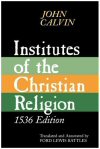
John Calvin was just 27 years old when the first edition of his Institutes was published in Basel in 1536. Building on the work of Erasmus and Luther, Calvin wrote with brilliance and passion of the many ways the church and its theology had been “deformed,” and he presented a case for restoring the church and theology to its pristine purity. Calvin’s “little book”—as he affectionately called it—grew in size through the rest of his life; eventually, this early, shorter version evolved into what is now known as the Institutes, the 1559 edition, which Calvin considered the authoritative form of his thought for posterity.
Noted Calvin scholar Ford Lewis Battles translated the 1536 Institutes in 1975, after completing his masterful translation of the 1559 Institutes. This revised edition is intended both for readers who wish to gain a better understanding of this earliest expression of Calvin’s theology and for scholars who may wish to pursue further research. It contains extensive notes and references. The book’s four appendices include a new translation of Calvin’s preface to Olivétan’s Bible (1535); the five indices include an index of biblical references and a comparative table of the 1536 and 1559 Institutes. The numerous citations in the endnotes from the writings of Calvin’s predecessors and contemporaries illuminate the significance of the text in its historical context.
For more information on this product, see here.
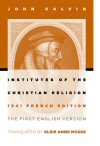
John Calvin originally wrote his famous Institutes of the Christian Religion in Latin. Beginning with the second edition of his work published in 1541, Calvin translated each new version into French, simultaneously adapting the text to suit lay audiences, shaping it subtly but clearly to teach, exhort, and encourage them. Besides reflecting a more pastoral bent on Calvin’s part, this 1541 Institutes is also notable as one of the founding documents of the modern French language.
Elsie Anne McKee’s masterful translation of the 1541 French Edition—the first-ever English version—offers full access to the brilliant mind of John Calvin as he considered what common Christian people should all know and practice.
Any who wish to encounter Calvin’s systematic theology at its most pastoral, freest from controversial preoccupations, and mediated through superlative translation, should devour this rendering of the Reformer’s own French version of the second edition of his Institutes. This volume should win Calvin many new friends.
—J.I. Packer, professor of theology, Regent College
This sparkling translation of John Calvin’s 1541 French Institutes offers modern-day readers in the English-speaking world the opportunity to read Calvin’s first version of his masterwork intended for a general audience. Elsie McKee is to be commended for her faithful yet accessible translation of this key text.
—Karin Maag, H. Henry Meeter Center for Calvin Studies, Calvin College and Seminary
For more information on this product, see here.
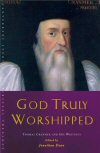
Archbishop Thomas Cranmer played a critical role in the development of the Church of England. He is best remembered as the prime editor and creator of the two Books of Common Prayer of 1549 and 1552, which stand at the head of Anglican liturgical identity and tradition. God Truly Worshipped offers a survey of Cranmer’s growth and development as theologian and leader of the church through the lens of his written work—liturgy, homilies, correspondence, and official doctrinal statements. This volume introduces Cranmer as a churchman, theologian, and liturgist whose contribution to Anglican spirituality cannot be underestimated.
Jonathan Dean is a Reformation historian. He studied classics at Oxford and theology at Cambridge, and then earned his PhD under Eamon Duffy. He lives in Chicago and teaches Christian history at Aurora University in Illinois.
For more information on this product, see here.
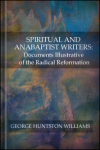
This volume comprises of a group of sixteenth-century writings once cherished and influential in fairly wide circles and intrinsically of no slight importance, but little known to modern readers. This anthology of Anabaptist writings includes sermons, addresses, letters, essays, and more, and editor George Williams supplies notes and annotations on all of them. Authors include:
- George Blaurock
- Thomas Müntzer
- Conrad Grebel
- John Denck
- Balthasar Hubamaier
- Michael Sattler
- Sebastian Franck
- Caspar Schwenckfeld
- Melchior Hofmann
- Obbe Philips
- Dietrich Philips
- Menno Simons
- and more
George Huntston Williams (1914–2000) was educated at St. Lawrence University, Meadville Theological School, and Union Theological Seminary, where he received his PhD. He then taught at Harvard Divinity School. He was also among the original Editorial Advisors of the scholarly journal Dionysius. His works include The Polish Brethren and The Attitude of Liberals in New England toward Non-Christian Religions, 1784–1885.
For more information on this product, see here.

Tyndale New Testament
- Author: William Tyndale
- Publication Date: 1526
Commenced in 1522, the Tyndale New Testament was the first English Bible translation to be translated directly from the Greek texts. With the invention of the printing press, the Tyndale New Testament was also the first English Bible to be mass produced, making it easily and widely accessible for the commoner to read and study.
Inspired by an illegal copy of Luther’s German New Testament, William Tyndale took to translating the New Testament for the English reader despite severe persecution and threat of punishment. His translation of the New Testament was based on the third edition of Erasmus’ Greek New Testament, Erasmus’ Latin New Testament, the Vulgate, and Luther’s German New Testament.
William Tyndale (1494–1536) was an English scholar, translator and linguist. Educated at both Oxford and Cambridge, Tyndale earned a degree in theology. He was also a gifted linguist, fluent in French, Greek, Hebrew, German, Italian, Latin, and Spanish. Influenced by Erasmus and Luther, he translated the New Testament and from Greek into English—against the wishes of the Church. Betrayed to the authorities, Tyndale was condemned as a heretic and burned alive in 1536.
For more information on this product, see here.
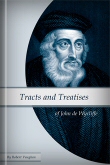
Robert Vaughan divides the work into three parts, the first of which is biographical. The second part of the volume is analytical, supplying a brief account of the writings of Wycliffe still in manuscript, with numerous extracts, and a translation from the original Latin of the most important chapters of the Trialogus. The third part contains over fifty tracts, treatises, letters, and more.
Robert Vaughan (1795–1868) was chair of history at London University from 1834–1842, then served as President and Professor of Theology at Lancashire Independent College from 1843–1857. During his time at Lancashire, he founded The British Quarterly, which he edited for twenty years. He was a prolific writer and editor, and his works include Causes of the Corruption of Christianity, The History of England under the House of Stuart, Protestant Nonconformity in Its Relation to Learning and Piety, Essays on History, Philosophy, and Theology, and The Modern Pulpit Viewed in Its Relation to the State of Society.
For more information on this product, see here.
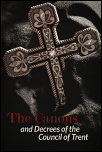
The Council of Trent convened in response to the teaching and rapid spread of the Protestant Reformation. In fact, its primary intent was to condemn and refute every Reformed doctrine. The Council issued numerous decrees and formal statements of Catholic doctrine on topics of salvation, the sacraments, and the canon. This council met for twenty five sessions from 1545 to 1563. The decrees issued at Trent have never been overturned and many were reaffirmed again at the Second Vatican Council during the 1960s.
For more information on this product, see here.
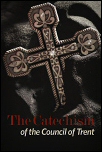
Previously called the Roman Catechism, The Catechism of the Council of Trent is considered by many to be the most important Catholic catechism. Although originally designed as a resource for parish priests to provide instruction, it is now used extensively by laypeople as a source of core Catholic theology. It contains the basic tenets of the Catholic faith, providing clear explanations of what is necessary for salvation. It also includes material on the Ten Commandments, the Apostles Creed, the Sacraments, and more.
The Council of Trent commissioned the first Church-wide catechism, finished in 1564. The Council dealt with the growing concern in the Church over the Protestant Reformation, and recognized the need for a document to teach the basics of the Catholic faith. The first English translation of the catechism was completed in 1839.
Every Catholic home should have this important catechism about the Holy Catholic Faith as it was reaffirmed by the present Holy Father, Benedict XVI, to be ‘an important Catholic catechism.’
—Online reviewer
For more information on this product, see here.